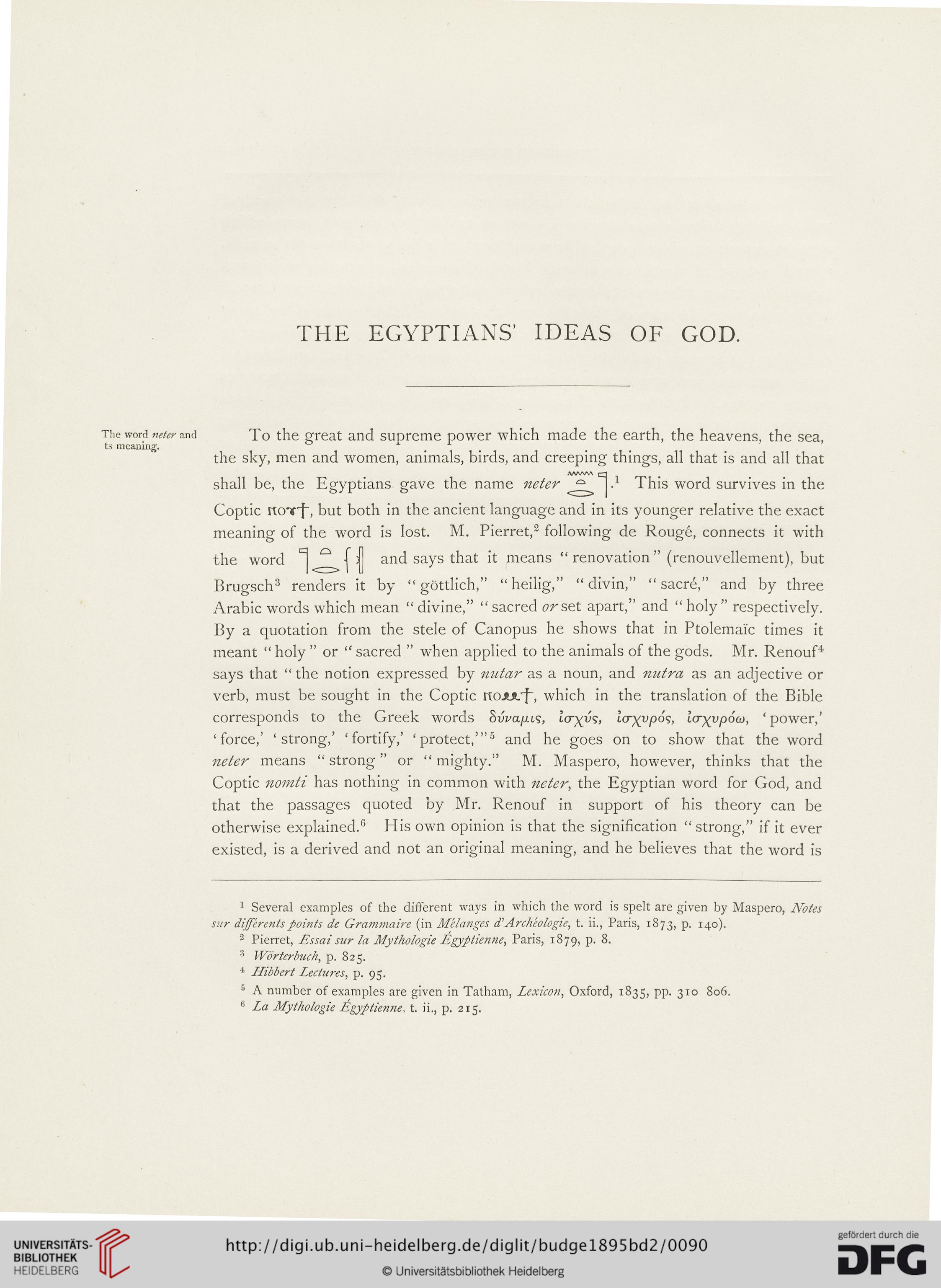THE EGYPTIANS’ IDEAS OF GOD.
The word neter and
ts meaning.
To the great and supreme power which made the earth, the heavens, the sea,
the sky, men and women, animals, birds, and creeping things, all that is and all that
.wvw\
shall be, the Egyptians gave the name neter Q | d This word survives in the
Coptic rtoY'f', but both in the ancient language and in its younger relative the exact
meaning of the word is lost. M. Pierret,1 2 following de Rouge, connects it with
the word
and says that it means “renovation” (renouvellement), but
Brugsch3 renders it by “ gottlich,” “heilig,” “ divin,” “ sacre,” and by three
Arabic words which mean “ divine,” “ sacred <?rset apart,” and “ holy ” respectively.
By a quotation from the stele of Canopus he shows that in Ptolemaic times it
meant “ holy ” or “ sacred ” when applied to the animals of the gods. Mr. Renouf4 5
says that “ the notion expressed by nutar as a noun, and nutra as an adjective or
verb, must be sought in the Coptic itojulT, which in the translation of the Bible
corresponds to the Greek words Swa/xt?, icryiR, l&xypos, lcr^vpoco, ‘power>’
‘force,’ ‘ strong,’ ‘ fortify,’ ‘protect,’”6 and he goes on to show that the word
neter means “ strong ” or “ mighty.” M. Maspero, however, thinks that the
Coptic nomti has nothing in common with neter, the Egyptian word for God, and
that the passages quoted by Mr. Renouf in support of his theory can be
otherwise explained.6 His own opinion is that the signifkation “strong,” if it ever
existed, is a derived and not an original meaning, and he believes that the word is
1 Several examples of the different ways in which the word is spelt are given by Maspero, Notes
sur differentspoints de Grammaire (in Melanges d’Archeologie, t. ii., Paris, 1873, p. 140).
2 Pierret, Essai sur la Mythologie ligyptienne, Paris, 1879, P- 8.
3 Worterbuch, p. 825.
4 Hibbert Lectures, p. 95.
5 A number of examples are given in Tatham, Lexicon, Oxford, 1835, pp. 310 806.
6 La Mythologie Jsgyptienne, t. ii., p. 215.
The word neter and
ts meaning.
To the great and supreme power which made the earth, the heavens, the sea,
the sky, men and women, animals, birds, and creeping things, all that is and all that
.wvw\
shall be, the Egyptians gave the name neter Q | d This word survives in the
Coptic rtoY'f', but both in the ancient language and in its younger relative the exact
meaning of the word is lost. M. Pierret,1 2 following de Rouge, connects it with
the word
and says that it means “renovation” (renouvellement), but
Brugsch3 renders it by “ gottlich,” “heilig,” “ divin,” “ sacre,” and by three
Arabic words which mean “ divine,” “ sacred <?rset apart,” and “ holy ” respectively.
By a quotation from the stele of Canopus he shows that in Ptolemaic times it
meant “ holy ” or “ sacred ” when applied to the animals of the gods. Mr. Renouf4 5
says that “ the notion expressed by nutar as a noun, and nutra as an adjective or
verb, must be sought in the Coptic itojulT, which in the translation of the Bible
corresponds to the Greek words Swa/xt?, icryiR, l&xypos, lcr^vpoco, ‘power>’
‘force,’ ‘ strong,’ ‘ fortify,’ ‘protect,’”6 and he goes on to show that the word
neter means “ strong ” or “ mighty.” M. Maspero, however, thinks that the
Coptic nomti has nothing in common with neter, the Egyptian word for God, and
that the passages quoted by Mr. Renouf in support of his theory can be
otherwise explained.6 His own opinion is that the signifkation “strong,” if it ever
existed, is a derived and not an original meaning, and he believes that the word is
1 Several examples of the different ways in which the word is spelt are given by Maspero, Notes
sur differentspoints de Grammaire (in Melanges d’Archeologie, t. ii., Paris, 1873, p. 140).
2 Pierret, Essai sur la Mythologie ligyptienne, Paris, 1879, P- 8.
3 Worterbuch, p. 825.
4 Hibbert Lectures, p. 95.
5 A number of examples are given in Tatham, Lexicon, Oxford, 1835, pp. 310 806.
6 La Mythologie Jsgyptienne, t. ii., p. 215.




